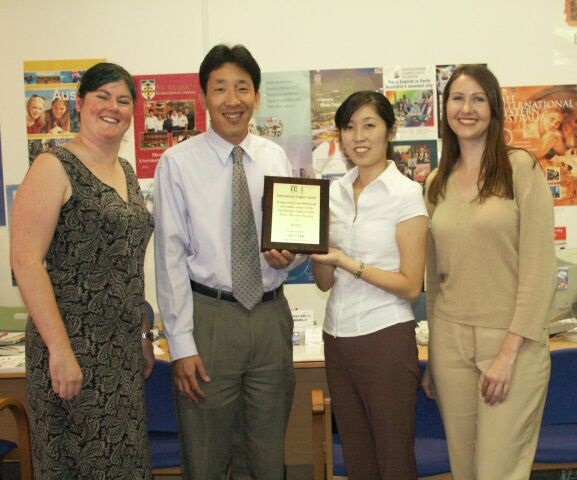Contents
こんにちは、イングリッシュ・ドクターの西澤 ロイです。
様々なレベルの英語学習者の方をゲストにお呼びして、
英語でしゃべっていただく「英語でSpeak Up!」。
今月のゲストは・・・
毎年約50ヶ国から約2,000人の外国人を受け入れている
「Homestay in Japan」の代表、
竹島 千歳さんです。
今回は、竹島さんが語学留学先で
最大限に英語を習得するため実践したこと
についてお話いただきました。
↓↓↓
英語でSpeak Up! #70:Mr. Questionと呼ばれた英語学習方法(Homestay in Japan竹島さん)
英語の書き起こし&日本語訳
払った授業料に見合う「本物の英語」を習得するために
Chitose: I had a nickname, ah… “Mr. Question”.
(私には『Mr. Question』というあだ名がありました)
――Mr. Question?
(『Mr. Question』ですか)
Chitose: Yes, Mr. Question means, I ask a lot of questions to the teachers.
(はい、先生にたくさんの質問をするからです)
――(Laughter)
(笑)
Chitose: Because, I was 25 years old, when I started study English.
(私が英語を学び始めたのは25歳で)
So, I have already experienced to work in a company.
(すでに企業での就労経験がありました)
So, I’m a business man partially.
(半分ビジネスマンでもあったので)
So, and then, I though, because I payed the tuition fee, English teachers should teach me the real English.
(授業料を払っているのだから、その分英語の先生たちは私に本物の英語を教えてくれるべきだ、と思ったのです)
Not only ah, grammar book, study books, you know.
(文法書や教科書の英語だけではなく)
All of the student watching “Mr. Bean”, so laughing together.
(授業で生徒皆で『ミスタービーン』を見て一緒に笑っていたのですが)
And then, end of the class time, teacher asked me, “what do you think?”
(授業の最後に先生が私に「どう思いましたか」と聞きました)
“What… what’s the story? Can you explain that?”
(「どんなストーリーでしたか、説明してもらえますか」と)
This is not English, you know ah… lesson, I thought.
(私は、これは英語の授業ではない、と感じました)
So, it’s not valued for the money I payed, okay.
(私が払った分に見合う対価を得られないと)
新しい英語の「表現」を知りたかった
Chitose: So, then I though, okay, this is my time.
(ですから、今が自分の時間だ、と思い)
I took the break time, okay, just walking towards to the teachers I asked many questions.
(休み時間に先生のところに行ってたくさん質問をしました)
Write it down in the paper, in the notebooks my questions.
(紙やノートに質問を書き出して)
Okay, and then, I asked a lot of questions to the teachers.
(先生にたくさん質問をしました)
Ah, I wanted to know the expressions.
(私は表現を知りたかったのです)
Ah… when I have this situation, how I can express myself, bla bla bla.
(例えば、特定の状況において自分の伝えたいことをどうしたら表現できるかなどです)
So, and then, this is the more practical work for the English… you know, ah… studies.
(英語を学習するためには、この方がより実践的です)
Because, ah, very tiny details, I had to explain to the teachers with ah… my limit of English skills of vocabularies.
(なぜなら、自分の限られた語彙を使って、より細かく具体的なことを先生に説明しなければならないのですから)
――Mmm.
(なるほど)
Chitose: Okay?
(ですよね?)
英語をしゃべるため授業の後に向かった先とは
Chitose: So, and then, ah… if I know some expressions from teachers of course, I got answered and that day, then I’m just jumping out the buildings, and go to the shop.
(そして、先生から表現を教えてもらったら、その日のうちに校舎の建物を出て、お店に行きます)
And then, hanging around the shops, and then I used that expression to the shop assistant, it’s free.
(そして、店の中をうろうろして、店員に対して習った表現を使うのです、タダでできますからね)
In ah… in the time nine o’clock to the three o’clock is normal in the study time in the language schools.
(語学学校の授業時間は9時から3時までなのですが)
So, is not enough for me speaking out.
(私にとって英語を話すには足りませんでした)
With non-native classmates, non-native speakers of the English.
(英語のネイティブスピーカーではないクラスメートとでは足りません)
So, then I was ah… looking for is a more opportunity speaking out with native speakers.
(私が求めていたのはネイティブスピーカーと話をする機会でした)
So, that’s why I just, you know, grabbed my new expressions from the teachers, and jumping out and just you know, using this expressions near by of the shops, of the schools.
(ですから、先生たちから新しい表現をつかみとって、外に飛び出し、その表現を学校の近くのお店で使いました)
